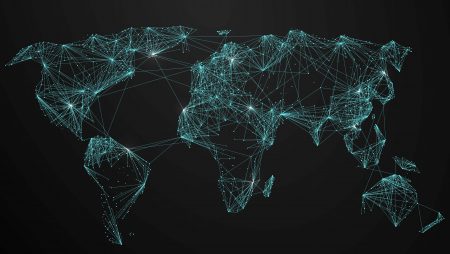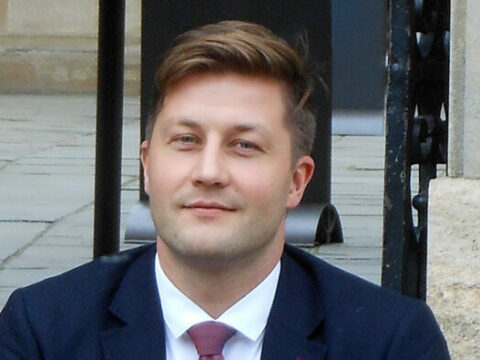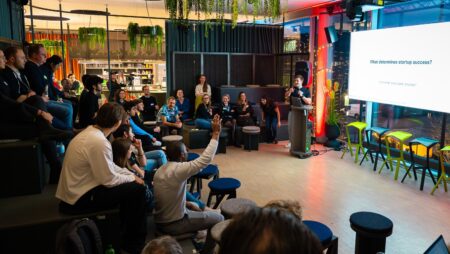
Research Programme on AI & Work
This programme supports research in the sphere of AI & Work.
Dr. Fabian Braesemann is a Departmental Research Lecturer in AI & Work at the Oxford Internet Institute and an Associate Faculty member at the Complexity Science Hub.
Fabian is also an Associated Researcher at the Einstein Center Digital Future in Berlin and Managing Director and Co-Founder of the DWG Data Science Company.
Fabian’s research is on complexity economics. He applies network and data science methods to study complex economic and social systems, including startup ecosystems, legal networks and the impact of technological change on the labour market, the platform economy, and the housing market.
Fabian leads the Science of Startups Initiative as a principal investigator. The research project aims to quantify the drivers of startup success, identifying evidence-based interventions that can help startup ecosystems function more effectively and help more startups succeed.
As part of the Science of Startups project, Fabian organises scientific entrepreneurship workshops in partnership with research institutions, startup incubators and university innovation offices. These workshops teach students how to transform their research into scientific spin-out companies, with the aim of driving more innovation from the social and economic sciences.
Fabian is convinced that the understanding of complex systems is crucial for solving the complex problems humanity faces today. Therefore, he believes that the scientific community needs to promote complex systems thinking more actively in the political and public discourse, with the aim of improving the general understanding of the systemic drivers behind the economic, political and social dynamics that shape our lives in the 21st century. To contribute to that mission, Fabian engages with policymakers, industry representatives, and the general public through newspaper articles and presentations at industry, political, and public events.
He has studied economics in Berlin, Warsaw and Vienna. He holds a doctoral degree from Vienna University of Economics and Business.
Complexity Economics, Complex Systems, Network Science, Social Data Science, Startup Ecosystems, Legal Complexity, Labour Markets, The Plaform Economy, Housing Markets.
Teutloff, O., Einsiedler, J., Kässi, O., Braesemann, F., Mishkin, P. and del Rio-Chanona, R.M., “Winners and losers of generative AI: Early Evidence of Shifts in Freelancer Demand“. J. Econ. Behav. Organ 235, 106845 (2025). https://doi.org/10.1016/j.jebo.2024.106845
McCarthy, P.X., Gong, X., Braesemann, F. et al. The impact of founder personalities on startup success. Sci Rep 13, 17200 (2023). https://doi.org/10.1038/s41598-023-41980-y
Braesemann F, Stephany F, Teutloff O, Kässi O, Graham M, Lehdonvirta V (2022) The global polarisation of remote work. PLoS ONE 17(10): e0274630. https://doi.org/10.1371/journal.pone.0274630
Stephany, F., Neuhäuser, L., Stoehr, N. et al. The CoRisk-Index: a data-mining approach to identify industry-specific risk perceptions related to Covid-19. Humanit Soc Sci Commun 9, 41 (2022). https://doi.org/10.1057/s41599-022-01039-1

This programme supports research in the sphere of AI & Work.

This project aims to reveal the determinants of success in entrepreneurship, startups and innovation ecosystems using data science and qualitative research methods.

This research project is examining the geographies, drivers, and effects of Sub-Saharan Africa's emerging information economies at a time of changing connectivity and Internet access across the region.

With Dr Fabian Braesemann and Professor Paul X. McCarthy
The impact of founder personalities on startup success, how a predictive model outperforms industry standards to predict company success, and what factors can help us predict which startups will succeed.

With Dr Fabian Braesemann
Dr Braeseman present his latest research on the work implications of generative AI during a live webinar with ETLA in Helskini.

With Professor Paul X. McCarthy, Dr Fabian Braesemann, Clara Durodié, and Guy Gadney
The Big Launch event of the Oxford Science of Startups Initiative brings together academics, founders, investors and various stakeholders from the Oxford and London innovation ecosystem.

With Dr Fabian Braesemann
Here, we show that founder personality traits are a significant feature of a firm’s ultimate success. We draw upon detailed data about the success of a large-scale global sample of startups.

4 July 2025
Dr Fabian Braesemann explores how rental levels in Vienna responded to the Covid-19 pandemic and asks what we can learn from Vienna to solve the global housing crisis.

29 January 2025
A new study led by an international research team, including Dr Fabian Braesemann from the Oxford Internet Institute, part of the University of Oxford, shows how Generative AI tools like ChatGPT are reshaping the workforce.

10 January 2025
As we start the new year in times of conflict, uncertainty, and despair, we should be hopeful that things can become better - if we trust science. An opinion piece by Dr Fabian Braesemann.

22 January 2024
Departmental Research Lecturer Dr Fabian Braesemann visited Germany to present his latest research on the power of personality in shaping the success of startups and beyond.

Die Presse, 04 July 2025
Housing needs have changed dramatically since the coronavirus pandemic. But supply isn't keeping pace. As a result, certain apartments are becoming more expensive.

Focus Online, 22 May 2025
The power of social media is shaping our society—not always for the better. Researcher Fabian Braesemann analyzes how the tech giants' platforms are driving social division and presents an alternative: a transparent, European social network.

The Globe and Mail, 17 June 2025
“Many entry-level workers are no longer asked to produce first drafts – they’re asked to orchestrate the tools that do it,” said Dr. Braesemann. “That may sound empowering, but it removes a key stage of learning.”
This course introduces students to statistics for the social sciences, with an emphasis on application to research on the Internet and society.